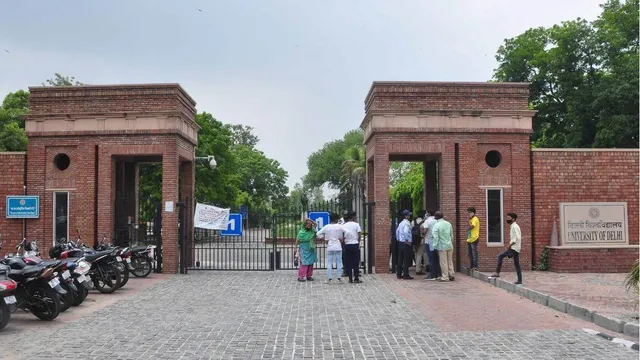- By Akansha Pandey
- Thu, 11 Sep 2025 06:18 PM (IST)
- Source:Jagran News Network
Four rounds of the undergraduate admission process at Delhi University (DU) have concluded, yet approximately 9,500 seats remain vacant across its colleges. The majority of these vacancies are in science and language courses, particularly in off-campus colleges. In a significant move to fill these seats, DU has announced a special "mop-up round" that will grant admission based on Class 12 marks, temporarily bypassing the CUET scores.
Now in its third year, the admission process through the Common University Entrance Test (CUET) is facing sharp criticism for its failure to fill seats effectively. The situation has drawn significant concern from teacher organiations who are questioning the complexity and efficacy of the current system.
The Vacancy Breakdown
Critics point out that while popular courses are filled quickly, many others are struggling to attract students. The data released by the university for the mop-up round highlights the scale of the problem:
Language Courses: In Sanskrit Honours, 800 out of 1,400 seats are vacant. In Punjabi, 112 out of 204 seats across five colleges are unfilled, and in Urdu, 127 out of 207 seats remain empty. This is despite DU allocating up to 100 per cent extra seats for these subjects.
Science Courses: Acharya Narendra Dev College alone has 115 vacant seats, all in science programs.
College-wise Vacancies: The issue is widespread, with Aditi College having 674 vacant seats, Bhagini Nivedita College with 709, Zakir Husain College with 387, Kalindi College with 385, Dyal Singh College with 311, Bharati College with 307, Shyam Lal College with 301, and Deshbandhu College with 295.
Teachers Blame Flawed CUET Process
Teacher groups argue that the previous cut-off based system was more efficient.
Prof. Pankaj Kumar Garg, Chairman of the Indian National Teachers' Congress (INTEC), stated, "Before CUET, when admissions were based on cut-offs, all seats used to be filled. Now, not only are seats vacant, but the academic session, which once began by July 16, now starts in August. This delay pushes students towards private institutions. The failure to fill seats in Sanskrit and Punjabi is particularly concerning, as the National Education Policy (NEP) calls for a focus on Indian languages."
According to Prof. Rajesh Jha of Academics for Action and Development (AAD), the system itself is the problem. "It has been over 50 days since the admission process began, yet thousands of seats are vacant. The CUET system is flawed, and students find the admission process through the CSAS portal confusing. Many miss out on admission due to filling incorrect choices or fail to secure a good college despite high scores. The CUET results are also not released on time, which further complicates the matter. DU should reconsider reverting to the old admission process."
The Democratic Teachers' Front (DTF) pointed out the irony in the university's solution. In a statement, they said, "The session started a month and a half ago. If admissions happen now, students may be reluctant to join. When the university has to ultimately resort to a mop-up round based on Class 12 marks, the entire CUET process itself becomes inconclusive."
While Delhi University hopes the mop-up round will resolve the issue of vacant seats, the controversy has raised fundamental questions about the future of the CUET-based admission system.

